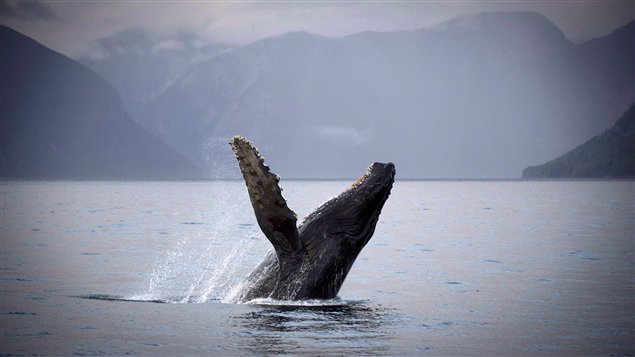Controversy has erupted over a government decision to change the status of North Pacific humpback whales from a species which is “threatened” to one of “special concern.” The downgrade reduces the level of protection afforded the massive mammals.
Change linked to oil pipeline project
Environmental groups are suspicious of the change pointing out that it comes at the same time as the government is assessing the multibillion-dollar Northern Gateway oil pipeline. The “threatened” status of these whales had stalled the pipeline project which would bring bitumen from the western oil sands to the Pacific coast to then be loaded onto ships. Now the way will be clearer to approve the project, and environmentalists fear the resulting tanker traffic will pose a serious threat to the whales’ recovery and survival.
The Committee on the Status of Endangered Wildlife in Canada or COSEWIC is an independent group of scientists responsible for assessing species at risk. It first recommended the improvement in the humpback whales’ status three years ago. In spite of that, the government developed a recovery strategy for the huge mammals.

Government “conveniently using science,” says professor
So why is the government now making the change which removes the obligation to protect the whales’ habitat? “I think the government is conveniently using science to serve its purposes here,” says Andrea Olive, a University of Toronto professor and author of Land, Stewardship and Legitimacy: Endangered Species Policy in Canada and the United States. “There’s instances where they don’t want to use science and there’s instances when they do.
Shipping will present dangers to whales
“They’re not going to protect the habitat of this species so they can approve projects that are now going to harm the habitat of that species,” says Olive. The potential danger for some 2,000 humpbacks in Canadian waters will come from striking ships, noise and oil pollution.
“Now is when the government needs to be acting to protect habitat,” says Olive. “Now is the time to start talking about how are we going to regulate shipping, how are we going to set aside marine protected areas, how are we going to make sure whale numbers don’t rapidly decrease.
“I think that’s the type of discussion we should be having, not how can we avoid doing anything, how can we get around protecting whales, how can we immediately pass this project and start shipping oil.”
Government denies ulterior motive
A government official denies the timing was related to any outside projects or pressures. “The decision that the government has made is based fundamentally on the scientific advice we got from COSEWIC,” said Trevor Swerdfager, a biologist and assistant deputy minister of ecosystems and fisheries management at the government department, Fisheries and Oceans Canada.
“We didn’t take this out of context. We didn’t ask COSEWIC to work in a different way. We didn’t skew the results in any way, shape or form,” he said.







For reasons beyond our control, and for an undetermined period of time, our comment section is now closed. However, our social networks remain open to your contributions.